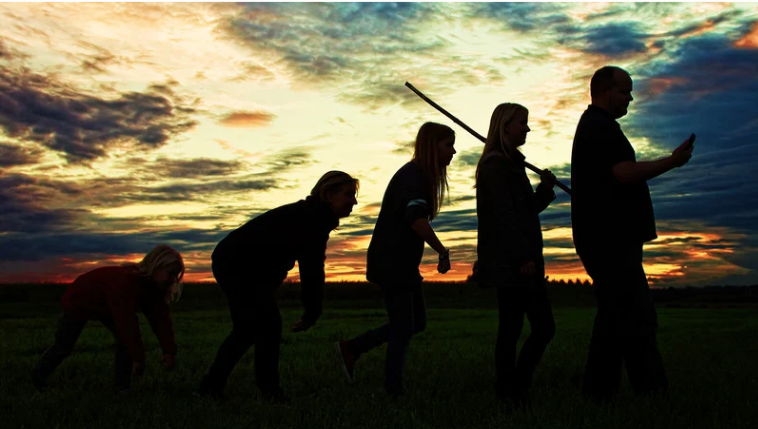The Hidden Secret For Becoming a Sexually Successful Male

Part 2
In Part 1 of The Hidden Secret For Becoming a Sexually Successful Male, I described the lessons I had learned in my life between the ages of 8 and 80 about becoming a sexually successful male. I said the secret was what I called Quiet Confidence or QC. Here, I want to help us understand why the secret of sexual success has been hidden from us.
I believe there are three, interrelated, reasons:
- Most males are taught what it means to become “sexually successful” by listening to males in our peer group and are often taught not to listen seriously to female wisdom.
- Evolution’s definition of sexual success focuses on survival and reproduction and points us in the wrong direction.
- For six to ten thousand years, humans have been living in societies where domination rather than partnership influenced our understanding of sexual success.
I was fortunate to have had a strong, yet sensitive, mother who supported my exploring nature and to the girls and young women who tutored me as I was growing up. Although I was influenced by a lot of negative and unhelpful “locker-room” male bravado and sexist, hurtful, advice that was drummed into my consciousness, I also met males who had a more helpful and healthful understand of sexual success.
Being part of a men’s group that has been meeting now for 45 years has been a major source of what I’ve learned and healthy male sexuality. It’s why the first “rule” in my book, 12 Rules for Good Menis to join a men’s group. Too much of the “Man Box” culture so many of us grew up in separates males from females, is often sexist, homophobic, and creates a “battle of the sexes” rather than loving partnerships.
Learning to work through our own fears and insecurities to truly listen to the females in our lives is a challenge. Too many of us were raised to believe that we live in two separate worlds, and often that girls are good, but superficial; while boys are bad, but successful. I still remember the nursery rhyme: “Little girls are made of sugar and spice and everything nice. Little boys are made of snips and snails and puppy-dogs tails.” We must let go of our emotional armoring, get in touch with our emotions, and allow ourselves to be vulnerable if we went to become sexually successful.
Evolution helps us understand how life changes through time, adapts or fails to adapt to the environment, and how life passes on life to future generations. Charles Darwin helped the world to better understand how life has evolved through time. In his book, Evolution for Everyone, professor of biology and anthropology, David Sloan Wilson says,
“Darwin’s theory of natural selection is like a recipe with three ingredients.”
- “We start with variation. Individuals such as you and I differ in just about anything that can be measured, such as height, eye color, or quickness to anger.”
- “Then we add consequence. The differences between you and me sometimes make a difference in our ability to survive and reproduce.”
- “The final ingredient, a sort of yeast that makes the recipe come to life, is heredity.”
Some assume that a theory means that what is being proposed is just an “idea” and isn’t “fact.” These folks believe that Darwin’s theory of evolution through natural selection is just an idea among many and has not yet been “proven.” But Dr. Wilson reminds us that “a theory is merely a way of organizing ideas that seems to make sense of the world. Scientific methods are merely ways of rejecting or supporting factual claims that emerge from theories.”
The theory of evolution through natural selection has allowed us to make accurate predictions about what we will see in the future. It explains a great deal about who we are and how we can live our lives. However, when we equate evolutionary ideas about sexual success with what will make us happy or bring about the kinds of relationships we want, we miss the mark. Evolution describes the process of differential survival and reproductive success to make babies and having them grow up to make babies of their own. It is not the ultimate guide to sexual success.
Too many men have viewed sexual success to mean, “finding as many young females as possible and convince them, or coerce them, into having sex with them.” Most people would agree, this is not the meaning of success that is likely to bring fulfillment, mutual benefit, and increased love and connection between members of a couple.
The third area that causes us to misperceive sexual success has to do with the dysfunction we have in society. Evolutionary success helps organisms successfully adapt to their environment. If the social environment is unhealthy, our adaptations to that environment will be unhealthy. Social scientist and scholar Riane Eisler was the first person to recognize that there were two competing systems that had evolved in human societies.
In her book, The Chalice & The Blade: Our History, Our Future, was published in 1987. World-renowned anthropologist Ashley Montagu said it was “The most important book since Darwin’s Origin of the Species.” In the introduction to The Chalice & The Blade, Eisler says,
“We are all familiar with legends about an earlier, more harmonious and peaceful age. The Bible tells of a garden where woman and man lived in harmony with each other and nature—before a male god decreed that woman henceforth will be subservient to man.”
She goes on to say,
“The Chinese Tao Te Ching describes a time when the yin, or feminine principle, was not yet ruled by the male principle, or yang, a time when the wisdom of the mother was still honored and followed above all.”
Eisler introduced a simple, yet profoundly helpful model that allows us to understand what occurred when these earlier times of harmony and peace were lost and the masculine principle began to overshadow the feminine.
“One result of re-examining human society from a gender-holistic perspective has been a new theory of cultural evolution. This theory, which I have called Cultural Transformation theory, proposes that underlying the great surface diversity of human culture are two basic models of society. The first, which I call the dominator model—the ranking of one half of humanity over the other. The second, in which social relations are primarily based on the principle of linking rather than ranking, may best be described as the partnership model. In this model—beginning with the most fundamental difference in our species, between male and female—diversity is not equated with either inferiority or superiority.”
I first met Riane Eisler in 1987, shortly after her book was published. I had been writing about similar issues related to sex and gender for some time. I described what I had learned in my first book, Inside Out: Becoming My Own Man, published in 1983. Riane and I met in San Francisco and compared our experiences and ideas. We soon became fast friends and colleagues. Our own work has evolved since then. I have written a number of additional books, as has Riane.
Her book, Nurturing Our Humanity: How Domination and Partnership Shape Our Brains, Lives, and Future, was written with anthropologist Douglas P. Fry and was published in 2019. They look back through human evolutionary history to examine when the dominator model was introduced into partnership cultures.
In chapter 7, “The Original Partnership Societies,” they tell us:
“A recurring pattern can be seen across archaeological sequences from diverse geographical locations indicating that warfare as an element of domination systems lacks ancient roots. It originated various times in different locations as some, but by no means all, forager societies underwent shifts toward intensification of resource extraction and greater social complexity. Before this, for most of human evolutionary history, domination systems simply did not exist. A very significant conclusion emerges: human nature under the long-standing era of partnership social organization; the human mind evolved in partnership contexts”. [emphasis mine.]
Important Takeaways From The Article
The reasons we have not recognized, fully understood, and more fully embraced practices of sexual success are because the truth has been hidden from men due to three, interrelated, factors:
- We were too heavily influence by dysfunctional male peer-group myths and failed to listen to the wisdom of females.
- Evolutionary emphasis on survival and reproduction misled us into thinking that sexual success was a competition for sexual conquest.
- Our minds, bodies, and spirits have been infected by elements of a domination system that that have disconnected us from our partnership roots.
Looking Ahead:
In the third part of this series, I will explore the practices that can bring about true sexual success for everyone. If you found this article helpful, please share it with others. If you’d like to read other articles and stay tuned into what we are doing at MenAlive, please subscribe to our free weekly newsletter. If you’d like to know about our Moonshot for Mankind, you can do so here.
I am considering offering an on-line workshop for those who would like to learn more about “The Hidden Secret of Becoming a Sexually Successful Man.” If you are interested, please drop me an email to Jed@MenAlive.com and put “Sexual Success” in the subject line and I will send you more details (It will be open to both men and women).







